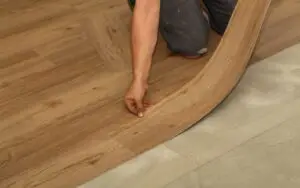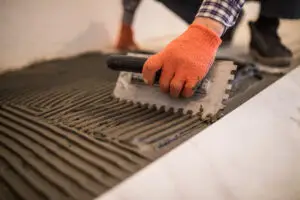Understanding DIY Flooring Installation
DIY flooring installation has become increasingly popular as homeowners look to save on renovation costs. It involves purchasing flooring materials and handling the installation process without the help of professionals. Many choose this route for the perceived savings and the satisfaction of completing a home project themselves. But is it the right choice for you? Let’s explore the pros and cons of DIY flooring.
What Is DIY Flooring Installation?
DIY flooring installation means tackling the entire process yourself, from choosing materials to preparing the subfloor, cutting the planks, and laying them out. This approach is often popular with laminate and vinyl flooring, which have user-friendly designs like click-and-lock systems.
Pros of DIY Flooring Installation
- Cost Savings: One of the biggest appeals of DIY flooring is the potential to save on labor costs. Professional installers can charge significantly for their services, so avoiding these costs can keep your project within budget.
- Flexibility: With DIY, you control the timeline. You can work at your own pace, whether that means spreading the job out over a few weekends or tackling it all in one go.
- Satisfaction of Accomplishment: There’s a certain pride that comes with completing a home project on your own. Many DIY enthusiasts enjoy the challenge and the satisfaction of a job well done.
Pros of Hiring Professional Flooring Services
While DIY may seem appealing, hiring a professional flooring installer comes with its own set of advantages, particularly in terms of expertise, efficiency, and the overall quality of the finished product.
Expertise and Precision
Professional installers have years of experience working with different flooring materials and complex spaces. They can navigate challenges like uneven subfloors or intricate patterns, ensuring a flawless finish. Their expertise reduces the likelihood of mistakes that can cost you more in the long run.
Time Efficiency
A professional installer can often complete a flooring project in a fraction of the time it takes a DIYer. This means less disruption to your living space and a quicker return to normal. If you have a large area to cover or a tight schedule, hiring a pro can make all the difference.
Warranty and Protection
Most professional flooring companies offer warranties on their work, covering potential issues that may arise after installation. This added layer of security can be worth the extra cost, providing peace of mind that any problems will be addressed without additional charges.
Cost Analysis: DIY vs. Professional Installation
One of the most critical considerations when deciding between DIY and professional flooring installation is the cost. Understanding where you can save money—and where you might end up spending more—can help you make the best choice for your project.
Materials Cost: DIY vs. Professional
When it comes to materials, DIYers can often find good deals by shopping around. However, professional installers may have access to higher-quality materials at wholesale prices, which can sometimes offset the difference in cost. Additionally, they can recommend the most durable options, ensuring a better long-term investment.
Labor Costs: Saving or Spending More?
DIY eliminates labor costs, but it's important to consider the value of your own time. If you have limited time or need to take time off work, the time spent on a DIY project could represent a hidden cost. Professional labor, though more expensive upfront, saves time and ensures a professional result.
Hidden Costs of DIY
DIY flooring can come with unexpected expenses, such as the need for specialized tools or correcting mistakes. For example, miscalculations in measurements can result in wasted materials, or improper installation can lead to future repairs. Factoring in these potential hidden costs is crucial for a true comparison.
Tools & Equipment Needed for DIY Flooring
If you decide to take the DIY route, you'll need specific tools to ensure a successful installation. While some tools can be rented, others may need to be purchased outright.
Essential Tools for DIY Installation
- Measuring Tape and Ruler: Accurate measurements are critical for a precise fit.
- Flooring Cutter or Saw: A reliable tool for cutting planks to the correct size.
- Rubber Mallet: Useful for securing click-and-lock planks into place.
- Knee Pads: Essential for comfort during hours spent on your hands and knees.
Specialized Tools and Equipment
Professionals often use advanced tools like floor sanders or specialized adhesives that can be expensive for DIYers to purchase. These tools help ensure a perfect finish and can make the job more efficient.
Rental vs. Purchase: Which Is Better for DIY?
For one-time projects, renting tools like a floor cutter or power saw can be more cost-effective than purchasing them. However, if you plan on tackling multiple flooring projects, investing in your own set of tools may be a wise choice.
Types of Flooring and Their Suitability for DIY
Not all flooring types are equally suited for DIY installation. Some materials are easier for beginners to work with, while others are best left to professionals.
Laminate and Vinyl: Best for DIY
Laminate and vinyl flooring are among the easiest to install, thanks to their click-and-lock systems that don’t require nails or adhesives. These materials are lightweight and can be cut with basic tools, making them ideal for first-time DIYers.
Hardwood: A Professional's Job?
Installing hardwood floors requires precision, especially when dealing with expansion gaps and exact alignment. Even a small mistake can lead to costly issues like buckling or warping. For this reason, hardwood is often best left to professionals.
Tile and Stone Flooring: DIY Feasibility
Tile and stone flooring can be tackled by ambitious DIYers but require careful planning and specialized tools like wet saws. Uneven grout lines or improper adhesive use can detract from the appearance, making professional installation a safer bet for a polished result.
Common Mistakes in DIY Flooring Projects
DIY flooring may seem straightforward, but there are some common mistakes that beginners often make, which can impact the final look and longevity of the floor.
Inaccurate Measurements and Cutting
Even slight errors in measurements can result in uneven gaps or wasted materials. Professionals have the experience to measure accurately and adjust as needed.
Poor Subfloor Preparation
Failing to properly prepare the subfloor is a common DIY mistake that can lead to uneven surfaces, causing squeaks or premature wear. Pros take the time to ensure the subfloor is smooth and level before laying down flooring.
Improper Adhesive Application
Using the wrong adhesive or applying it incorrectly can cause tiles or planks to come loose over time. Professionals understand which products work best for different materials and conditions.
DIY vs. Professional Services: Real-Life Examples
Example 1: Successful DIY Laminate Installation
A homeowner installs laminate flooring in a small bedroom, saving hundreds on labor costs. Despite a few beginner mistakes, the project is completed within a week, and the result is satisfactory.
Example 2: Professional Rescue of a DIY Gone Wrong
After struggling with uneven tiles and adhesive issues, a DIYer calls in a professional to correct mistakes. The added costs of repairs make the project more expensive than hiring a professional from the start.
Example 3: Time-Sensitive Professional Job
A homeowner hires a professional for a large living room renovation. The job is completed in three days, allowing the family to enjoy their new space quickly and without stress.
By carefully weighing the pros and cons of DIY versus professional flooring installation, you can make an informed decision that aligns with your budget, skill level, and desired outcome. Ready to start your flooring project? Contact a professional installer today to ensure a seamless finish!





